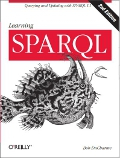![[RDF/OWL and RDF schema]](http://www.snee.com/bobdc.blog/img/rdfs.png)
First, I'd like to thank Danny, Morten, Damian, Richard, Kendall, and Ralph for their insights about my question last week on existing use of RDF/OWL for integration of separate, non-RDF databases. I've been doing some follow-up research via email, and will report back on what I find out.
This week's question about real-world use of RDF metadata: is anybody using RDF Schema for the sake of RDF Schema, or has RDFS become little more than a layer of RDF/OWL? For example, we use rdfs:domain and rdfs:range in our RDF/OWL ontologies, but have owl:Class and owl:subClassOf completely replaced the use of rdfs:Class and rdfs:SubClassOf? In other words, has RDF/OWL, as an extension of RDFS, replaced the use of RDFS by itself, or is anyone still creating and using RDF Schemas that use nothing from the owl namespace?
My guess is that the answer is no; no one creates RDF Schemas for the sake of RDF Schemas anymore. Tools exist to ease the creation of ontologies without requiring much interaction with RDF/OWL syntax, letting people add all the metadata that RDFS allows and more. RDFS has become just another namespace used to define certain aspects of RDF/OWL ontologies.
Corrections? Confirmations? Counter-examples?


My impression, that has no real backing - apart from my gut feeling, is that less people use owl, as more and more realise that really understanding and implementing the inferencing required to make owl work is almost impossible. (AND if you manage it's horribly slow)
I thought more people use RDFS plus a few selected properties from either OWL or the protege extensions, i.e. cardinality constraints and (inverse)functional properties. (which of course means they dont use the intended RDFS semantics either... )
I don't want to begin a discussion here of whether OWL's popularity is increasing or decreasing and why, so I'll skip to your second point: I proposed that people are only using RDFS constraints in combination with OWL, and you said that "more people use RDFS plus a few selected properties from either OWL or the protege extensions to set up an ontology." Are you saying that the use of RDFS+Protege extensions is a common use of RDFS without OWL?
thanks,
Bob
I'm not aware of owl:subClassof and owl:Classes (and OWL in general) are only needed if the level of expressiveness needed in an ontology is not sufficiently covered by RDFS. In my experience, people tend to use OWL reflexively since it's name suggests that it is an ontology language whereas RDFS isn't.
Yes, essentially RDFS is really just a convenient subset of RDF/OWL with specific limitations for decidability.
see: http://owl1-1.cs.manchester.ac.uk/Tractable.html#6_RDFS
I think you hit the nail on the head.
The Swoogle folks should set up an Amazon wishlist... then we can bug them with questions like this without feeling bad.
I'd love to see stats.
RDFS by design, is just one way of making simple claims about RDF vocabulary. OWL mostly just extends this, but there are a few awkwardnesses, where you're forced to either jump one way, or the other, ... or be verbose and a bit tricksy. For eg., you can say that something is both and owl:Class and an rdfs:Class. Staying in OWL DL is an additional complication, of course... And we've got a rules language coming down the pipeline soon, so this really is a neverending story...
The tough part for the Swoogle query would be to ask by date, i.e. my question would really be answered by figures that show the total number of RDF Schemas with no use of the OWL namespace vs. the number of OWL ontologies that do use RDFS, broken down by year.
My gut reaction is that the former figure would go down from year to year as the latter one went up.
We wondered about that too and looked into it for a paper to appear in ISWC 2006. I just made a post with some data from our paper.
We'll think about adding a wish list that people can use to suggest new Swoogle features and also pose questions that we might be able to answer from the underlying database.
Tim
Tim --- Re wishlist, ... even just a page in the ESW wiki might be useful. E.g., I'm definitely interested to learn more about FOAF property usage, especially the current mess around names (firstname, surname, given family etc etc). Nice work with the Geo writeup too btw, that was very handy.
We have a similar paper, with a difference focus/analysis, in ISWC to Tim's.
First, a minor point: there is no owl:subClassOf. There is only rdfs:subClassOf.
Second, I never see a point in using rdfs:Class unless you want to (rather artificially) stay in RDFS (oh, ok, you may want to work with RDFS *cough* reasoners, but most of them will do the right thing if you *use* the class as a class, e.g., as the object of a type triple). If you ever want to make use of OWL, it's going to be a bit of a PITA. Not a huge one, I guess, but, eh, why cause that pain.
Third, RDFS is just plain silly. I made an LC (or similar) comment advocating its removal. Alas, that didn't fly :) OWL may be silly too, in a variety of ways, but it at least is fairly substantive in its expressive power. The tractable fragments page (, disclaimer, I work with Bernardo and chatted with him about it) inclusion of RDFS is more for historical reasons, i.e., to isolate the fragment of RDFS that is OWL DL compatible.
The person who wrote:
Is not correct. I do not believe that decidability was ever a concern of the designers of RDFS ("simplicity" perhaps) (I'd welcome a pointer to contrary information). RDFS metamodeling is not easily extensible wihout going undecidabible, which is a hint.
Sigh. Why claim so much if it's backed by nothing. In point of fact, it's not impossible or even almost impossible. It's not remotely impossible. And OWL DL reasoning isn't horribly slow (depending on what you do and what you mean by slow). Are there scalability issues? Bien sur! But so? It's true for everything. And normal RDF entailment (with the actual semantics) is intractable too.
I tend to object to the use of the word "constraint" with RDFS...RDFS is not constraint minded at all. To be a constraint, there needs to be a meaningful way to violate the constraint. Practically speaking, there isn't one in RDFS.
A small nitpick - there is no owl:subClassOf statement. The idea was to layer OWL on top of RDFS, so OWL vocabulary does not add statements if an equivalent statement already exists in RDFS.
As far as the use of owl:Class, why not? There is no clear disadvantages of using it as opposed to rdfs:Class.
The problem with using RDFS on its own is that it has very limited utility. On the other hand, RDFS plus a few OWL axioms (namely, inverse, transitive and inverse functional) does quite a bit.
Going forward I can also see people using RDFS plus rules, possibly by-passing OWL.
Another problem with RDFS is that it has very unconventional semantics, most people just don't understand it. By this I mean the interaction between domain statements and subclasses. Majority of people who are familar with notions of classes and properties, assume that if class A is in the domain of property p and class B is a subclass of A, then B is also in the domain of property p because in their mind subclasses supposed to 'have' all the properties of their parents.
s/Dave Beckett recently suggested using a WIki/Dan Brickley recently suggested using a Wiki/ ;)
(maybe Dave suggested it too...)
Sorry. It was late.
Bijan,
If decidability wasn't an explicit concern at the time of RDFS' inception, it would only be because a fully expressive DL was not on the roadmap for RDF at the time. But I don't think it is a coincidence that RDFS *is* a specific DL language. And that it is a subset of OWL *is* irrefutable - I would think you shouldn't need to be convinced of that.
And it's sort of tongue in cheek to welcome a contrary pointer when you have none along with your own assertions....